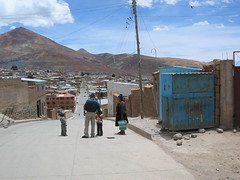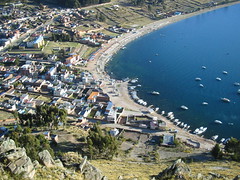A long way between La Paz and Potosi, the map deceives: they are more than ten hours by bus through the wildest Bolivian Andean plateau. “I am Potosi, the rich”… Thanks to the largest silver mine in the world, this city has experienced an incredible colonial splendor, in large part still visible because since the hunger for silver is decreased, the time stopped in Potosi. The city is now a fossil of a glittering past, a gem set among the peaks that, given the exaggerated altitude of the Andean plateau, are reduced to mere hills, bare and colorful. The people are friendly and gladly tell the secrets of Potosi: its quiet, its festivals, the hidden beauty, the characters who lived there and the countless numbers of miners who have left their lives chasing the ephemeral wealth in the bowels of the Cerro Rico, in the den of the devil.
It applies well to Potosi the concept of Bolivian buen vivir, a series of propositions and recipes married by the Bolivian people, at least in words, with the vision to ensure a future of consensus and sustainable progress, in harmony with the mother earth and respecting the cultural specificities of Bolivia, a vast and diverse country stretching from the Andes to the Amazon, with a kaleidoscopic wealth of cultures. One of the postulates of living well is to know how to eat well. In Potosi we taste a dish that well summarizes the concept, the k’alaphurka: a delicious soup of tomato, pepper, ají (hot sauce), choclo (young corn), some meat and spices, which is cooked in pumice stone and served in an earthenware dish. A plate of great topicality due to its simple origin and local ingredients.

